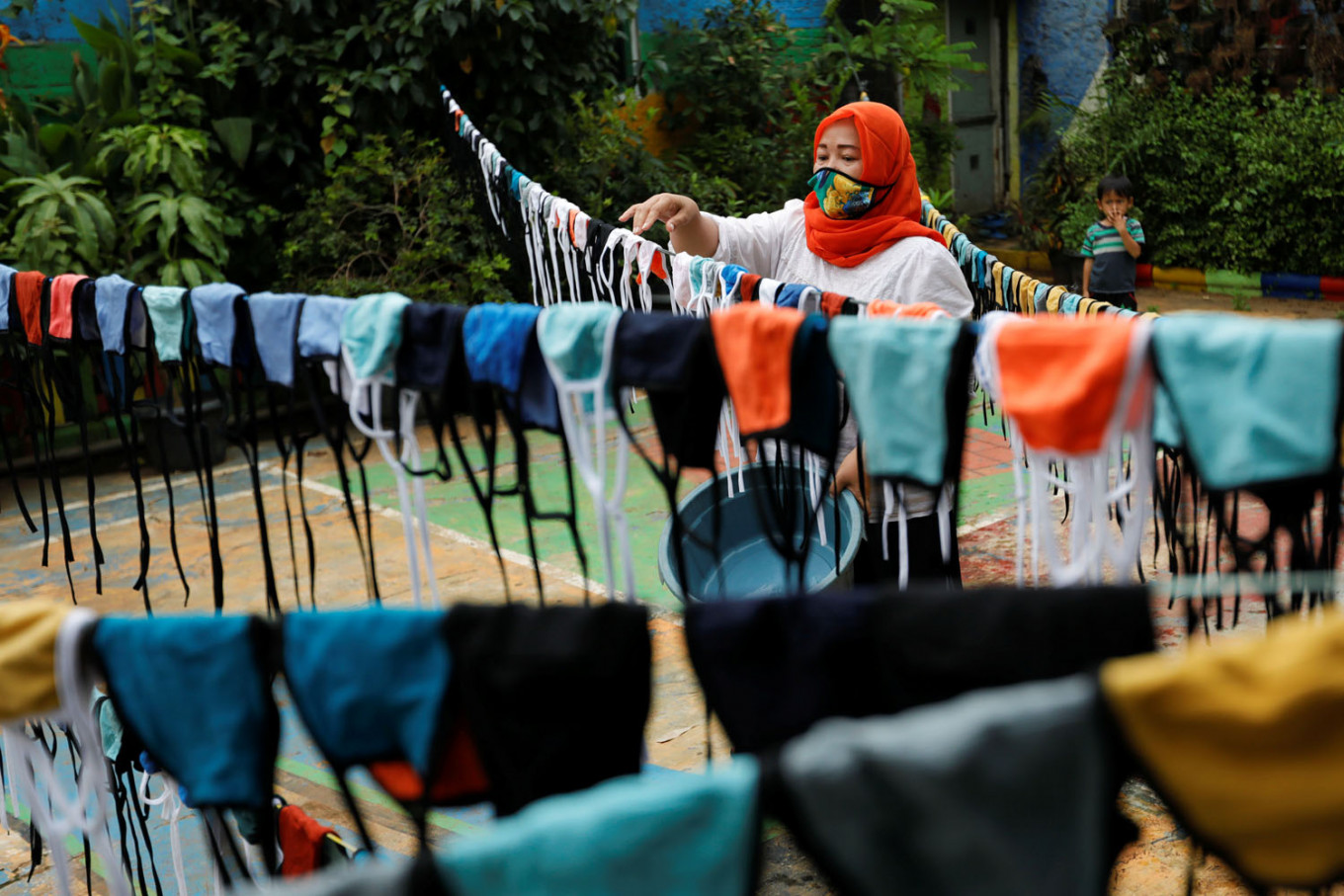Popular Reads
Top Results
Can't find what you're looking for?
View all search resultsPopular Reads
Top Results
Can't find what you're looking for?
View all search resultsPast experiences have shaped countries' responses to COVID-19: Experts
Singapore and South Korea are among the Asian countries that have made significant progress in containing COVID-19 infection, with both very much influenced by past experience with virus outbreaks, said Tikki Pangestu, a professor at the Lee Kuan Yew School of Public Policy in Singapore.
Change text size
Gift Premium Articles
to Anyone
P
ast experience dealing with other outbreaks appears to have greatly contributed to how prepared countries have been to control the spread of COVID-19.
Singapore and South Korea are among the Asian countries that have made significant progress in containing COVID-19 infection, with both very much influenced by past experience with virus outbreaks, said Tikki Pangestu, a professor at the Lee Kuan Yew School of Public Policy in Singapore.
Singapore lost quite a number of health workers, doctors and nurses from Severe Acute Respiratory Syndrome (SARS) in 2003, he said. The virus, which is closely related to the new coronavirus, infected 238 people in Singapore, out of a total of 8,096 people worldwide.
“Obviously, Singapore’s response is very much influenced by its experience with SARS. SARS left an impact on [the country’s] mindset [so it was prepared for] the worst case scenario,” Tikki said in a recent webinar organized by the Centre for Strategic and International Studies (CSIS).
According to Singapore’s Health Ministry, of the probable SARS cases, 41 percent were healthcare workers and 43 percent were family members, friends or social contacts of other cases.
Singapore’s first SARS patient was admitted to Tan Tock Seng Hospital for treatment of atypical pneumonia. She infected a nurse who was in close contact with her, who would later pass on the virus to another 25 people, one of whom was later transferred to the coronary care unit, where she infected another 27 people. The three super spreading events contributed to the outbreak that resulted in a total of 109 SARS cases.
South Korea's experience with 2015 Middle East Respiratory Syndrome (MERS) led to an immediate response to the COVID-19 pandemic since China published the genetic sequence of the coronavirus.
“In the case of South Korea, its specific experience with MERS was that infections were spread from a businessman arriving from the Middle East, going from hospital to hospital, spreading it to others,” Tikki, the former director for research policy and cooperation at the World Health Organization (WHO), said.
The first South Korean patient, a 68-year-old man returning from the Middle East, was diagnosed with MERS nine days after he initially sought medical treatment. The South Korean government at the time was criticized for down playing the significance of the virus.
“Because of that they took very early precautions to protect health workers. That is something that perhaps other countries are not quite prepared for," Tikki said.
In Jakarta, Indonesia’s epicenter of the COVID-19 outbreak, at least 174 medical staff had tested positive for the virus as of Saturday, according to Jakarta COVID-19 task force head Catur Laswanto.
Read also: Discourse: Take preventive measures in COVID-19 fight: UN official
By Sunday afternoon, Indonesia had recorded 399 new confirmed cases, bringing the total of infections to 4,241 with 373 deaths.
South Korea reported 27 new cases on Friday, its lowest figure after daily cases peaked at more than 900 in late February, according to the Korea Centers for Disease Control and Prevention (KCDC) as reported by Reuters, taking the country's total to 10,450 cases.
Meanwhile, in Singapore, more than 2,200 people have tested positive for the virus, with eight deaths.
Tikki said Singapore’s medical and public health response, social capital and good governance had greatly contributed to its reaction and anticipation in dealing with the pandemic.
“I am aware of the fact that Singapore is a special and unique case that may not work elsewhere, and [I] cannot compare it to Indonesia. It's just not transferable, but the basic principle still holds true,” he said. “The most important thing now is that we need speed in reaction and anticipation, these are critical to delay the spread of the virus.”
Every country needs a strong, resilient, responsive and sustainable health system to deal with future pandemics, he said, adding that they also needed to be prepared for a new normal.
“Will the virus disappear like SARS or MERS, I don’t think so personally. It is more likely it will become sort of endemic with mostly mild cases like the seasonal flu. […] we have to learn [to deal] with it and keep in mind that our healthcare system must be prepared,” he said.
Numerous foreign experts have previously said the coronavirus outbreak had exposed the failure of health authorities worldwide to learn from past flare-ups like MERS and SARS. Bruno Canard, a virologist at France's National Center for Scientific Research, said that some countries, notably European Union members, had launched coordinated research programs following SARS, Reuters reported last month. But the financial crisis of 2008 put a squeeze on funding, he said.
Read also: World failed to learn SARS lessons for coronavirus fight
Indonesia, meanwhile, told a meeting of ASEAN senior officials earlier this month that it was time for the bloc to hold a virtual special summit with its "plus three" partners – Japan, South Korea and China – to share knowledge on how the three were dealing with the pandemic.
The Chinese city of Wuhan is where the disease first emerged about three months ago, while South Korea has been praised around the world for its strategy to control the outbreak through massive early testing programs.










